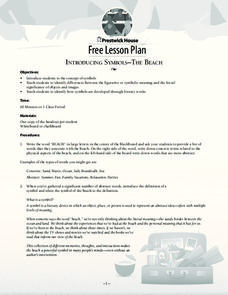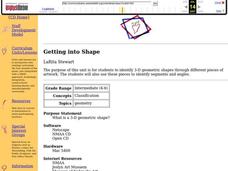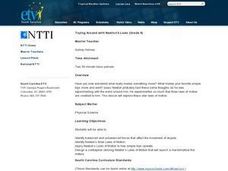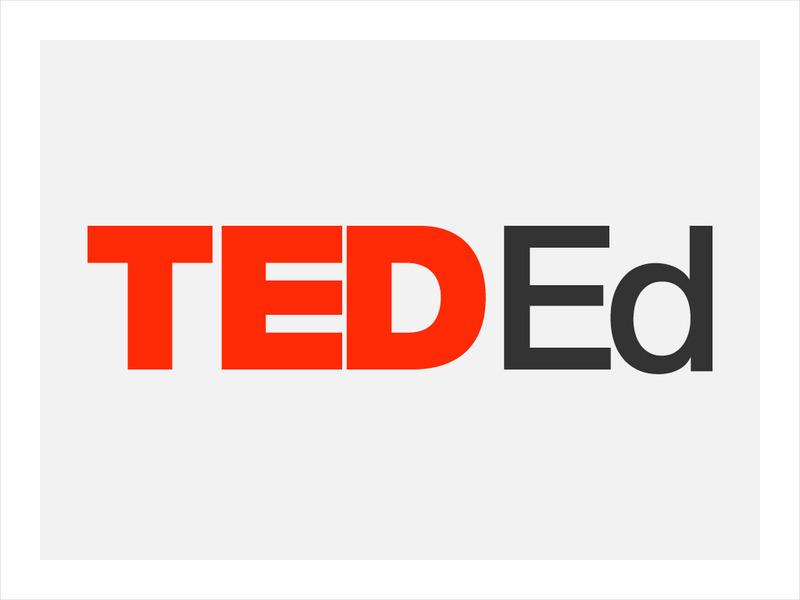National Gallery of Canada
Memories of the Past
Explore contemporary American Indian art. After viewing a set of images, class members discuss the design elements of techniques present, as well as how these artists represent history and culture. Learners examine the parfleche and...
Novelinks
The House of the Scorpion: Concept Analysis
Considering using Nancy Taylor's award-winning science fiction novel The House of the Scorpion as an option for book circles or as a whole-class reading? Check out this packet that includes background information, information about the...
Prestwick House
Introducing Symbols–The Beach
Looking for a way to introduce class members to the concept of symbolism and multiple levels of meaning? Readers examine two different passages about the beach and consider how the writers use concrete objects, and places to represent...
Curated OER
Creating Civic Awareness Through Artistic and Literary Forms
Interpret current events using editorial cartoons and other print media. Middle schoolers explore the meanings of literary and artistic terms such as satire, irony, and caricature. They visit internet sites to develop an understanding of...
Curated OER
Getting into Shape
Students identify 3-D geometric shapes through different pieces of artwork. They examine and identify segments and angles. Students act out shapes and create a piece of artwork. Additional cross curriculum activities are listed.
Curated OER
Photosynthetic Pictures--Are Worth More Than a Thousand Words
Students observe and examine how carbon dioxide, water, and light produce glucose/starch through a process called photosynthesis.
Curated OER
Toying Around with Newton's Laws
Eighth graders identify balanced and unbalanced forces that affect the movement of objects and Newton's three Laws of Motion. Students also design a contraption utilizing Newton's Laws of Motion that will launch a marshmallow five meters.
Curated OER
Things Are Heating Up!
Third graders study how heat is produced from mechanical and electrical machines and human activities.
Curated OER
Uncharted Territory
Students examine what were preconceived perceptions of the areas Lewis and Clark explored. They compare and contrast past and modern maps of North America. They accurately place route and site information on the map.
Curated OER
Self-esteem Builder
Students recognize and acknowledge each other's strengths as well as becoming more aware of their own through this activity. They write positive comments about each other and turn them into positive paragraphs.
Curated OER
Math: Musical Patterns
Students employ their five senses to interpret and duplicate instrumental patterns. Following the teacher's patterns, students clap their hands and later use instruments such as bells, triangles, or cymbals to create their own "songs."
TED Talks
Ted: Ted Ed: Schrodinger's Cat: A Thought Experiment in Quantum Mechanics
Austrian physicist Erwin Schrodinger, one of the founders of quantum mechanics, posed this famous question: If you put a cat in a sealed box with a device that has a 50% chance of killing the cat in the next hour, what will be the state...
TED Talks
Ted: Ted Ed: Mary's Room: A Philosophical Thought Experiment
Imagine a neuroscientist who has only ever seen black and white things, but she is an expert in color vision and knows everything about its physics and biology. If, one day, she sees color, does she learn anything new? Is there anything...
American Museum of Natural History
American Museum of Natural History: O Logy: Train of Thought
Try out your ability to think like Einstein by working through two thought experiments that help explain how satellites stay in orbit and how the speed of light affects the universe.
TED Talks
Ted: Ted Ed: What Can Schrodinger's Cat Teach Us About Quantum Mechanics?
One great example of quantum physics' weirdness can be shown in the Schrodinger's cat thought experiment. Josh Samani walks us through this experiment in quantum entanglement. [5:24]
PBS
Pbs: Simple Games That Explore Feelings
Identify and explore a wide range of human emotions and then participate in a classroom parade dramatizing emotions through body movements and facial expressions.

















